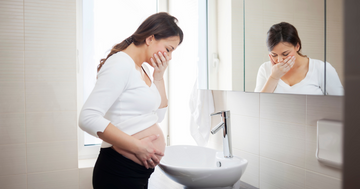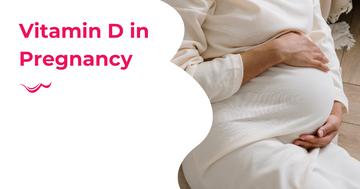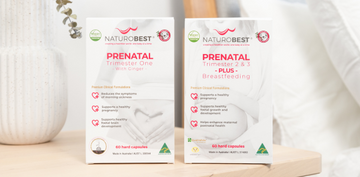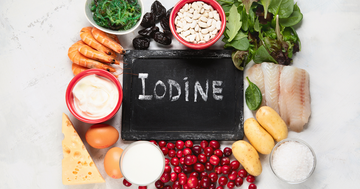Is your prenatal vitamin making you sick?
by Nikki Warren on Jun 28, 2022

In an effort to have the healthiest baby possible, most women will seek prenatal vitamins. To support a healthy pregnancy and baby. But what if your prenatal vitamin is making your morning sickness worse?
Is that even possible? Yes, absolutely.
There are certain ingredients in a prenatal multi that often cause women to feel ill.
In the early weeks of pregnancy, symptoms of morning sickness can occur. Women look for morning sickness relief. Relieving morning sickness can be important to achieve a health pregnancy.
Nutrients can affect morning sickness. Vitamin B6 can be helpful in some. Iron supplementation and iodine during pregnancy can increase morning sickness. High doses of vitamin b12 and zinc supplementation can increase morning sickness too.
Iron
Studies show that iron supplementation in the first trimester can aggravate the symptoms of morning sickness.
There is an increased requirement of iron in the last half of pregnancy. As women are often deficient in the first trimester, this leads to quite a dilemma.
I advise women to increase their dietary intake of foods high in iron. Foods that are high in iron include red meat, dried peaches, and apricots. If a woman is iron-deficient, I recommend Iron & Brain Support which is nice and gentle on the stomach. This can be taken a few times weekly if that is all she can tolerate.
Zinc
Zinc supplementation is known to cause nausea in some people whether they are pregnant or not.
Zinc is one of the most important minerals throughout the entire preconception, prenatal and postnatal period. The recommended daily intake (RDI) of zinc is 11mg daily. Usually, this amount will not cause nausea for most women.
Iodine
The pregnancy hormone, HCG, stimulates the thyroid in the first trimester. This is known to aggravate the symptoms of morning sickness.
Embryo’s use hcg to increase access to iodine. An embryo’s requirement for nutrients is a priority during pregnancy. This is to the detriment of the mother’s health if her nutrient supply is deficient.
According to studies, when iodine is plentiful, morning sickness ranges from frequently mild to occasionally severe.
If morning sickness is absent this may indicate the woman has hypothyroidism. You can check with your health professional via a blood test.
A lot of prenatal vitamins contain 270mcg of iodine in a daily dose. This is because they have been designed for the entire preconception, prenatal and postnatal period. 270mcg is the RDI during breastfeeding.
The RDI of iodine during pregnancy is 220mcg and the minimum amount recommended amount from supplementation is 150mcg.
To give you an idea of iodine consumption in the diet. A 1/4 teaspoon of Himalayan crystal salt contains 100mcg of iodine.
B vitamins
High doses of some B vitamins can often make women feel ill. However, one study showed that high doses of vitamin B12 were effective in relieving morning sickness.
Several studies show 75mg of vitamin B6 and 1300mg of ginger in a daily dose. Reduces the frequency and severity of morning sickness.
It is essential to have at least 500mcg of folate from supplements. In the month prior to conception and the first 6 weeks of pregnancy when the neural tube closes.
As you can see, the requirement of nutrients changes dramatically throughout a pregnancy.
Taking a prenatal vitamin that has a separate formula for the first trimester is a sensible option during pregnancy. NaturoBest's Prenatal Trimester One with Ginger is a prenatal vitamin. That also provides morning sickness relief with 75mg of vitamin B6 and 1300mg of ginger.



